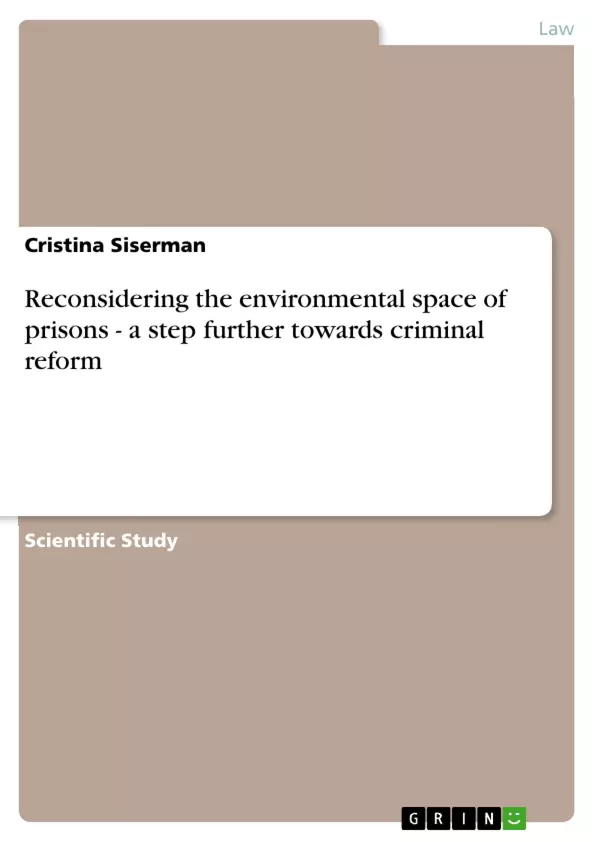The present study presents, from an interdisciplinary perspective, the space of prisons by putting forward elements pertaining to both environmental psychology and law and by discussing the effects that this space has on transforming and shaping the behavior of the inmates. It also examines the negative consequences of some social processes involving personal space, crowding, privacy, as well as the psychological effects of the prisons on the behavior of the convicts and the costs that they have on their rehabilitation. Nonetheless, the study proposes some alternatives and ways of improving the life of the convicts in these environments in order to ensure a better reintegration into the society.
Keywords: prison, behavior, psychological effects, criminal reform, rehabilitation, United Nations Standard Minimum Rules for the Treatment of Prisoners, International Convention on Civil and Political Human Rights, European Prison Rules etc.
Inhaltsverzeichnis (Table of Contents)
- Abstract
- 1. Introduction
- 2. The Prison as an environmental space
- 2.1 Prison: concept definition
- 2.2 Why can environmental psychology be of help?
- 3. Personal space and privacy in prisons
- 3.1 Concepts definition
- 3.2 Increasing the privacy sphere and self-development
- 4. The crowding effect in prisons
- 4.1. The effects of crowding
- 4.2. Reducing the overcrowding effect
- 5. Designing more fitting environments for rehabilitation
- 5.1. What does prison designing imply?
- 5.2. The environmental elements that enable the rehabilitation
- 6. Conclusions
- REFERENCES
Zielsetzung und Themenschwerpunkte (Objectives and Key Themes)
The research study aims to understand the impact of prison environments on inmate behaviour, focusing on how these spaces influence transformation and shaping of their behaviour. It explores the interplay between environmental psychology and law, examining the negative consequences of social processes related to personal space, crowding, and privacy.
- Impact of prison environments on inmate behaviour
- Environmental psychology and its role in understanding prison spaces
- Negative consequences of social processes within prisons
- Effects of overcrowding and lack of privacy on inmate well-being
- Designing prison environments that foster rehabilitation
Zusammenfassung der Kapitel (Chapter Summaries)
- Introduction: This chapter introduces the concept of prison reform and its importance in achieving a more effective criminal justice system. The study highlights the need to consider the psychological impact of incarceration and to understand how prison environments can be transformed to facilitate positive change.
- The Prison as an Environmental Space: This chapter explores the definition of prison as an environmental space and explains why environmental psychology is crucial in understanding and improving prison conditions. It also discusses the relationship between environmental factors and the behaviour of inmates.
- Personal Space and Privacy in Prisons: This chapter examines the concepts of personal space and privacy within the context of prisons. It explores the importance of these factors for inmate well-being and self-development, and discusses potential ways to increase privacy and autonomy in prison settings.
- The Crowding Effect in Prisons: This chapter focuses on the negative effects of overcrowding in prisons, discussing the psychological impact on inmates and exploring potential methods to reduce overcrowding.
- Designing More Fitting Environments for Rehabilitation: This chapter delves into the importance of designing prison environments that promote rehabilitation. It outlines the key environmental elements that can facilitate positive change and reintegration into society for inmates.
Schlüsselwörter (Keywords)
The primary keywords and focus topics of this research study include prison, behaviour, psychological effects, criminal reform, rehabilitation, United Nations Standard Minimum Rules for the Treatment of Prisoners, International Convention on Civil and Political Human Rights, and European Prison Rules.
Frequently Asked Questions
How does prison architecture affect inmate behavior?
The study explores how environmental factors like personal space, crowding, and privacy directly influence the psychological well-being and behavioral transformation of inmates.
What is the role of environmental psychology in prison reform?
Environmental psychology helps identify how physical surroundings can either hinder or support rehabilitation, providing a scientific basis for designing better correctional facilities.
What are the psychological effects of overcrowding in prisons?
Overcrowding leads to increased stress, lack of privacy, and higher aggression levels, all of which negatively impact the chances of successful reintegration into society.
How can prison design foster rehabilitation?
By incorporating elements that allow for self-development, such as quiet spaces, natural light, and areas for social interaction, the environment can actively support the rehabilitation process.
Which international rules are mentioned regarding prisoner treatment?
The study references the United Nations Standard Minimum Rules for the Treatment of Prisoners and the European Prison Rules as frameworks for reform.
Why is privacy important for convicts?
Privacy is essential for maintaining a sense of self and dignity. A complete lack of privacy can lead to psychological breakdown and hinder the development of personal responsibility.
- Quote paper
- Cristina Siserman (Author), 2012, Reconsidering the environmental space of prisons - a step further towards criminal reform, Munich, GRIN Verlag, https://www.grin.com/document/193717



